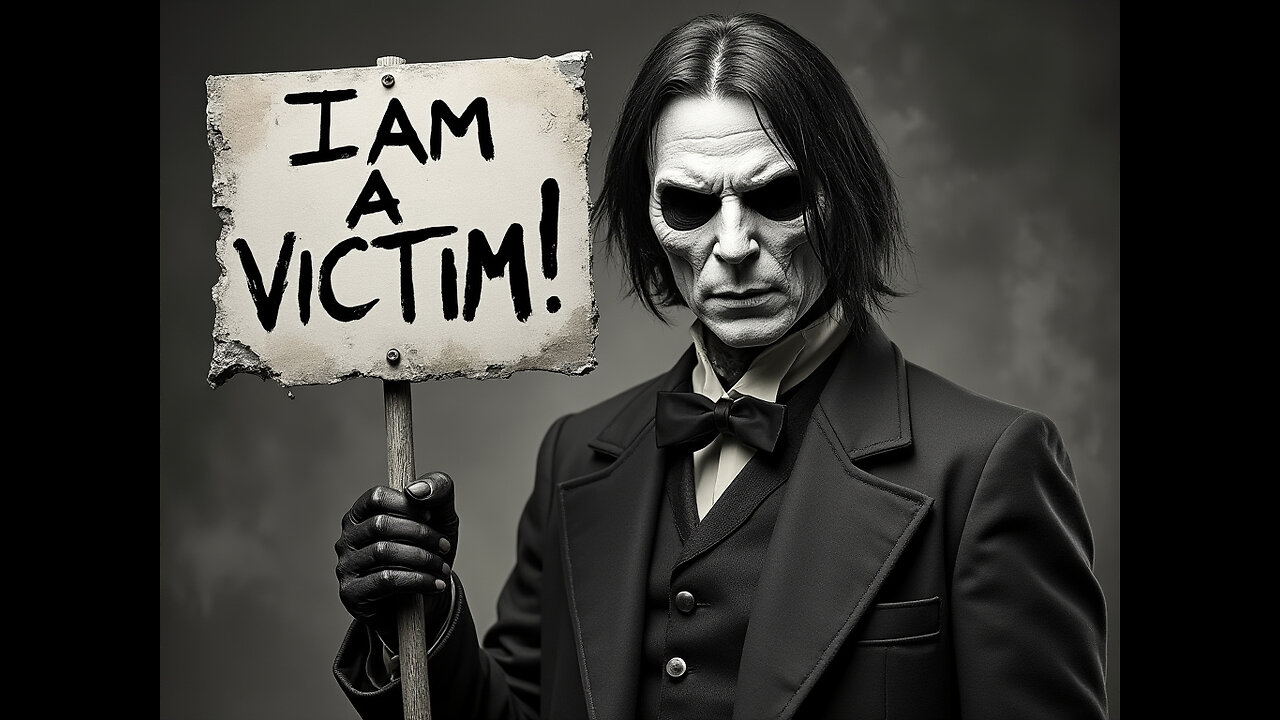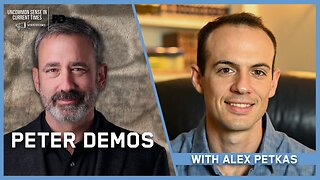Premium Only Content

Victimhood - The Preferred Choice.
The Power of Playing the Victim: The Perfect Disguise for the Predator.
In today’s society, the status of “victim” can carry a surprising amount of weight. The very word evokes empathy, compassion, and an immediate assumption that the individual has been wronged. We live in a culture that encourages us to believe the victim first and ask questions later, and this dynamic is a perfect opportunity for those with less-than-honourable intentions. In fact, if you are a predator, playing the victim can be the perfect disguise.
Protection and Sympathy from Authorities.
One of the most significant advantages of assuming the victim role is the protection that often comes with it. Whether consciously or unconsciously, authorities like the police are inclined to protect the perceived vulnerable party. The mere assertion of victimhood can initiate an investigation, prompt restraining orders, and even lead to criminal charges against the alleged offender—all before any real evidence is evaluated.
This means that a predator who knows how to weaponize victimhood can manipulate the system to work in their favour. By appearing weak and wronged, they can turn the attention away from their own actions and onto the individual they are targeting. Instead of being viewed as an aggressor, they gain protection under the guise of vulnerability, making it that much harder for their true nature to be exposed.
Wielding the Sympathy Card.
Victimhood elicits automatic sympathy. People feel the need to protect and defend the victim, sometimes without even understanding the full situation. It’s human nature to rally behind someone in distress. For the predator, this is an invaluable tool. They can cry crocodile tears and paint a picture of suffering, and often, this portrayal will be enough to manipulate not just authorities, but social circles, communities, and even the media.
The image of the suffering individual plays into a narrative where questioning the victim becomes taboo. In some cases, just suggesting that the “victim” might not be entirely truthful can lead to social backlash. Playing the victim also allows the predator to turn any criticism or probing questions into further evidence of their “persecution,” adding more fuel to the sympathy fire.
The Assumption of Being Wronged.
One of the greatest strengths of victimhood in today’s social climate is the assumption that if you claim to be a victim, you have, in fact, been wronged. This is particularly true in high-profile cases involving abuse, harassment, or any perceived imbalance of power. There’s an implicit bias in public perception that favours the victim, often before any investigation has even begun. Once the predator has successfully painted themselves as the victim, the burden of proof tends to shift, and the alleged perpetrator is often seen as guilty until proven innocent.
This inversion of justice works particularly well for predators who understand how to exploit emotions. By positioning themselves as the aggrieved party, they manage to flip the power dynamics. Now, their real victims are seen as the aggressors, while they bask in the sympathy and protection provided by the system.
Deflecting Guilt and Manipulating Public Opinion.
A predator who plays the victim can also use this role to deflect their own guilt. If someone raises accusations against them, they can simply counter with claims of their own victimhood, muddying the waters. This is a tactic often used in toxic relationships or cases of abuse, where both parties may accuse the other of wrongdoing. By casting doubt on who is truly at fault, the predator can confuse the narrative and make it difficult for outsiders to discern the truth.
Moreover, the predator’s victim narrative can be broadcasted to sway public opinion. In an age of social media and instant judgement, crafting the right story can turn an entire community or online audience against the real victim, making it incredibly challenging for the truth to surface.
Shielding from Scrutiny.
Perhaps one of the greatest benefits of playing the victim is the shield it provides from scrutiny. Once someone is perceived as having suffered, any attempts to investigate their own actions can be seen as cruel or unnecessary. “Haven’t they been through enough already?” becomes the refrain, effectively discouraging deeper examination into their behaviour. A predator, therefore, remains in the shadows, hiding behind their victim status while continuing to manipulate their surroundings.
The role of the victim also grants moral high ground. They are seen as someone who has been wronged, someone who deserves justice. In the eyes of many, they are the righteous party. This makes it harder to challenge their narrative, as any attempt to do so can be construed as further victimisation.
The Ideal Disguise for the Predator.
For a predator, there is no better cloak than the role of the victim. It offers protection from law enforcement, sympathy from the public, and a shield from scrutiny. It provides them with a platform to manipulate the truth, playing on people’s emotions while distracting from their own misdeeds. This is why, in cases of abuse or harassment, we sometimes see predators effectively weaponizing victimhood to turn the tables on their accusers.
Ultimately, society’s instinct to protect and empathise with victims is noble, but it can also be exploited. While real victims should always receive the support they need, we must also remain vigilant against those who use victimhood as a mask to further their own agendas. The predator in victim’s clothing is a dangerous individual, one who thrives on the trust and goodwill of others—turning them into pawns in their own twisted game.
The Power of Playing the Victim: The Perfect Disguise for the Predator.
https://x.com/KingArthurII2/status/1847227572888756730
-
 LIVE
LIVE
The Big Mig™
10 hours agoFauci’s Fiction w/ Dr. Michael J Schwartz
2,168 watching -
 UPCOMING
UPCOMING
Edge of Wonder
3 hours agoChina’s DeepSeek AI Engineered to Censor, Control & Overpower USA
7582 -
 LIVE
LIVE
Quite Frankly
5 hours ago"Small Town Charm, ICE ICE Baby, Open Lines" 1/28/25
1,152 watching -
 LIVE
LIVE
Chrissy Clark
2 hours agoJohn Fetterman TRIGGERS “The View,” Deportations Upset Selena Gomez, & MORE I Underreported Stories
236 watching -
 59:42
59:42
PMG
5 hours agoManhood in Crisis: What Ancient Rome Can Teach the 21st Century
1.91K1 -
 LIVE
LIVE
Akademiks
3 hours agoASAP Rocky Case has Begun . He's facing 24 years for SH**ting his friend!
3,119 watching -
 1:58:50
1:58:50
Revenge of the Cis
4 hours agoEpisode 1436: Adios Amigo
24.3K5 -
 1:14:45
1:14:45
Awaken With JP
6 hours agoTrump's Making Everyone His B*tch LOL - LIES Ep 76
72.7K47 -
 1:41:43
1:41:43
Megyn Kelly
1 day agoMedia's ICE Hoax, Vance's Masterclass on CBS, & Trump vs Bass, w/ Steve Bannon & Batya Ungar-Sargon
89.3K77 -
 1:04:28
1:04:28
In The Litter Box w/ Jewels & Catturd
1 day agoGreen New Scam | In the Litter Box w/ Jewels & Catturd – Ep. 729 – 1/28/2025
88.9K37